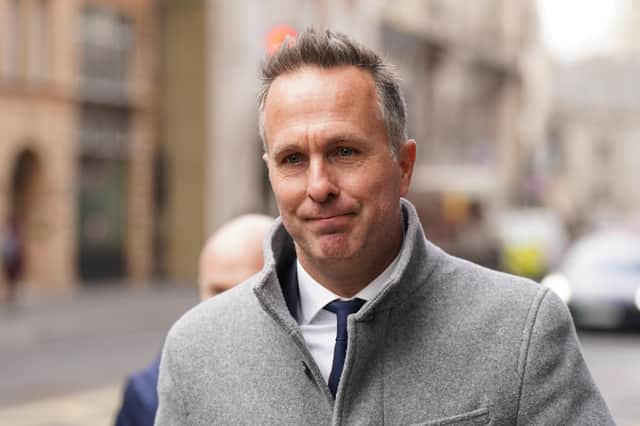Chris Waters comment - Michael Vaughan's determination exposes flaws in ECB racism probe


Imagine if John Blain, Tim Bresnan, Andrew Gale, Matthew Hoggard and Richard Pyrah had all turned up to the CDC hearings, all given evidence in the racism case.
Instead, only Michael Vaughan is defending himself in public, with Gary Ballance having pleading guilty to his charge.
Advertisement
Hide AdAdvertisement
Hide AdAll the others passed up the chance to defend themselves citing obvious concerns with the scope and integrity of the process - Gale as far back as last June when he labelled the ECB probe a “witch-hunt”.
It is interesting to imagine precisely because of the effect that Vaughan’s involvement has had on events.
In the public evidence/cross-examination thus far, with concluding submissions to be presented on Tuesday by both sets of lawyers, the former England captain and his legal team have exposed serious flaws not only in the frankly porous charge against him - the supposed “you lot” comment of 14 years ago - but in the whole case per se, which would seem to have rather more holes than the 4,000 in Blackburn, Lancashire, of popular culture.
Of course, not everyone has the wherewithal to assemble the crack legal team at Vaughan’s disposal; he also has a broadcasting career to pursue, while others are effectively out of the game.
Advertisement
Hide AdAdvertisement
Hide AdBut representation could still have been obtained or, if potential legal costs were an issue, the defendants could simply have turned up in person and had their say; that they did not emphasises their mistrust in a process in which the ECB has been the investigator, prosecutor and, say some, judge and jury too.
Although Vaughan cannot be sure even with the best lawyers of exoneration, his determination to fight all the way has highlighted how much of this case has never been examined. The evidence and testimonies of Matthew Wood, the former Yorkshire batsman, and Liz Neto, the club’s former HR manager, who spoke in Vaughan’s defence, were explosive to say the least, ranging from premeditated and vengeful allegations of racism to blackmail and coercion (hardly the usual stuff that the CDC deals with).
With more than 20 witnesses, as I understand it, ready to have spoken on behalf of the others had the hearings been private, as they were initially to be before Azeem Rafiq’s demand midway through the ECB investigation that they must be public, one wonders how much more information could potentially have emerged. As the ECB’s chief witness, Rafiq’s threatened withdrawal unless they were public would have plunged the process into further confusion, while also leaving the ECB facing accusations of not being serious about tackling racism.
Even the semi-scrutiny engendered by Vaughan’s participation has thrown up more questions than answers – Wood’s claim, for example, in his witness statement that he told his superiors at the Professional Cricketers’ Association that Rafiq had threatened to “hit them (Yorkshire) with the race card” if they did not give him a new contract in 2018 (Wood was Rafiq’s PCA rep at the time).
Advertisement
Hide AdAdvertisement
Hide AdThat would be the same PCA which, under cross-examination from the Digital, Culture, Media and Sport select committee last year, made no mention of that fact and instead branded criticism of the reforms at Yorkshire as “abhorrent and obstructive”.
With the activities of the select committee, the ECB and Yorkshire having already been challenged in myriad ways, it would seem that the PCA is just another institution with questions to answer.
Meanwhile, ahead of the closing submissions to the CDC, Monday brought fresh newspaper allegations against Yorkshire: namely, that the club lied regarding a charge to which they have pleaded guilty concerning the destruction/deletion of key case documents.
In evidence last week, Yorkshire co-chairman Lord Kamlesh Patel’s claim in a recent interview that “the ECB urged him to get rid of people” at Yorkshire was not corroborated by the ECB itself, raising yet more questions.
Advertisement
Hide AdAdvertisement
Hide AdAs revelation follows revelation, seemingly day after day, and as Vaughan’s appearance at the CDC showed, a proper, transparent investigation at the very start, one utterly removed from Yorkshire and the ECB, would have saved a lot of time, money and hurt.
Hindsight, of course, is a wonderful thing; less so the hysteria that has characterised this case.